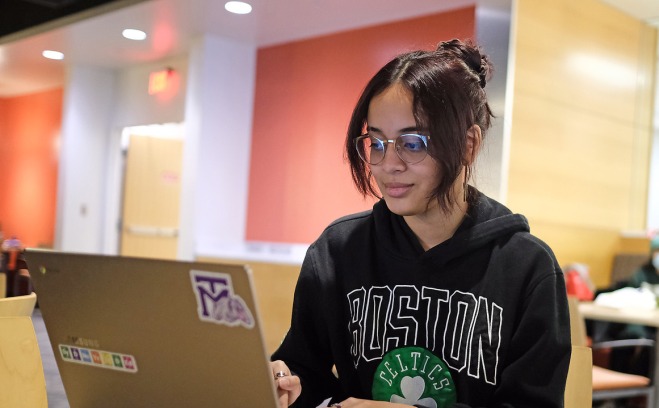
The Office of Financial Aid assists students who, without financial assistance, would be unable to attend college. Last year alone, we awarded $43 million in financial aid to our students through the following:
- Merit-based: Awarded to new students through the admissions application process
- Need-based: Awarded to new and returning students through the financial aid application process—including scholarships, loans, grants, and work study assistance
Our commitment to making a Fitchburg State education affordable is evident in our annual cost—among the lowest in the state university system for full-time residential students. Learn more on our tuition and fees page.
Getting Started
How to Apply
Eligibility
Important Deadlines
Additional Information
Demonstrated by our most recent financial aid statistics for our entering class (2022):
- All admitted students who demonstrated financial need and met application deadlines received an offer of financial assistance.
- The average financial aid package for students living on campus from Massachusetts is $14,717 (from all funding sources).
- 91% of the class received financial assistance.
And from our graduates:
- The average student loan debt for those in the class of 2022 is well below the national average at $24,239. This equates to $257 per month in standard repayment.
- The average graduate’s income is $58,741.
Helpful Resources
- College Navigator - This site contains information from the National Center for Education Statistics including student loan information and default rates.
- Loan Repayment Calculator - This site, from the U.S. Department of Education, helps you calculate student loan payments and choose a loan repayment option that best meets your needs and goals. You can also use it to decide whether to consolidate your student loans.
- Cohort Default Rate (CDR) - The U.S. Department of Education tracks the number and percentage of federal student loan borrowers who default on their student loans within three years of entering repayment. This is the Cohort Default Rate, commonly referred to as “three-year” CDRs. The Department of Education releases official cohort default rates for each school that is eligible to participate in the federal student loan program once per year. The current 2019 national cohort default rate average is 2.6% while Fitchburg State University’s is 1.5% and 4.8% for 2018 and 6.4% for 2017. Should the CDR for Fitchburg State University rise above the national average it is our policy to publicly post such on the University's financial aid webpage.
- Our investment in you. With a $15 million endowment from alumni and the foundation, both need- and merit-based awards help to offset the actual cost of your education.
- A realistic budget. We base your eligibility for our financial aid on the total cost of attendance not just direct costs, so that you’ll have a more realistic budget and financial-aid package.
- Honoring outside awards. We do not reduce our institutional scholarship or grant award to those receiving outside scholarships or grants unless the student's total gift aid exceeds charges for tuition, fees, housing and meal plan / food.
- Access to distinctive opportunities. To aid our students in making their dreams of study abroad possible, financial aid is portable to approved abroad programs. Students may also benefit from college funding for internships throughout the academic year.
At Fitchburg State University, each financial aid appeal is reviewed on a case-by-case basis within our general guidelines for awarding need-based financial aid. While we don’t negotiate financial aid or match another school’s offer, we are always willing to talk with students and families who are concerned that they can’t afford Fitchburg State University with their award.
If you decide you need to appeal your financial aid award, we ask that you complete the Financial Aid Appeal Form and submit that to our office with all necessary supporting documentation.
To provide some guidance, here are some of the most common reasons we may increase financial aid awards:
- Significant decrease in current year’s income not reflected in your tax return
- Receipt of a one-time income source on the previous year’s tax return
- Unemployment of a parent or spouse
- A change in the number of family members attending college
- Unusual or unexpected medical expenses
- Tuition for a child attending a private elementary or secondary school
There is no guarantee that we will be able to adjust your award, but we encourage you to work with our office as we may be able to recommend a financing strategy that supplements your award.
If you would like to speak with the Financial Aid Office, regarding a financial aid appeal, please reach out to our office at 978.665.3156 or by email finaid@fitchburgstate.edu.
SNAP benefits, formerly food stamps, provide a monthly benefit to assist with purchasing nutritious food. This assistance is available to qualified low-income citizens, including students. You can learn more about the program, determine your eligibility, and even apply online. More information on SNAP and the Falcon Bazaar can also be found online.
- Verdadero o Falso de FAFSA: Obtén la Verdad–y el Dinero que Necesitas para la Universidad
- School Code 002184
- Financial Aid on MyFalcon
- Apply for your FSA ID
- Net Price Calculator
- Academic Works for current students to apply for Foundation scholarships
- 2026-2027 FAFSA is open and will use your 2024 income information
- Complete your Entrance Counseling and Master Promissory Note
- Financial Aid Award Guide (PDF)
For assistance please contact your individual financial aid counselor (see below) regarding any assistance needed in processing your financial aid.
Bridget Hudson
Administrative Assistant
bhudson5@fitchburgstate.edu
978.665.3157
And by caseload at:
Andrea Johnston - Associate Director
Last Name A-E
ajohnst5@fitchburgstate.edu
978.665.3422
Alcira Zadroga - Associate Director
Last Name F-Ma
azadroga@fitchburgstate.edu
978.665.3556
Christopher Cole - Assistant Director
Last Name Mc-Z
ccole14@fitchburgstate.edu
978.665.3454


